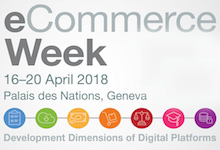Digital economy for development – A European strategy
16 Apr 2018 12:00h - 13:00h
Event report
[Read more session reports from the UNCTAD E-Commerce Week 2018]
This session was moderated by Mr Carl Hallergard (Deputy Head, EU Delegation to the United Nation in Geneva). Dr Mukhisa Kituyi (Secretary-General, United Nations Conference on Trade and Development (UNCTAD)) opened the session praising the considerable increase in attendance and number of events at the UNCTAD E-commerce Week this year.
Ms Mariya Gabriel (Commissioner, Digital Economy and Society, European Commission) said that the citizens’ interest must be at the heart of digital policy. The EU contributes over half of the official development assistance (ODA) throughout the world. Although digitalisation is not a priority for all development platforms, its value and need for integration is clear. She stated that digitalisation drives development, and this is why the EU digital strategy calls for the integration of development. This includes creating affordable broadband, teaching digital skills, and bolstering online entrepreneurship. She spotlighted their digital investment projects in Africa, including the millions in financial assistance they invested in these countries.
Dr Amani Abou-Zeid (Commissioner for Infrastructure, Energy, ICT and Tourism, African Union Commission (AUC)) mentioned Africa’s 10% continental increase in Internet access. Abou-Zeid said that integrating technology in development strategies is imperative for the creation of new employment opportunities. Africa is the most youthful continent, and as a result there is untapped potential that comes with digital development. Broadband penetration is as low as 16%, due in part to a widening infrastructure gap. The AUC identified the following areas as critical for digital improvement: (i) transition to a network-based society, (ii) developing an information and communications technology (ICT) infrastructure programme, and (iii) universal Internet access to computers/devices. He stated that the AUC aims to increase access to digital infrastructure, but also prioritises data protection, taking into account all aspects of digitalisation.
Mr Jérémy Doutte (Co-CEO of e-commerce, Jumia Group) summarised the rapid development in technology, and how developed countries and successful companies champion the Internet industry. His company aims to unleash entrepreneurship in least developed countries (LDCs), so people can ‘move at the speed of the Internet’. Doutte shared his hopes in the quality of unreached talent in Africa, fuelling his optimism for the future of e-commerce throughout the continent. Jumia’s goal is not to bring companies like Amazon to Africa but to build a platform where more ‘Amazons’ can develop. He underlined how the Internet equalises playing fields, and how his company offers opportunities for people to take hold of the potential.
By Isabel Ashley
Related topics
Related event

